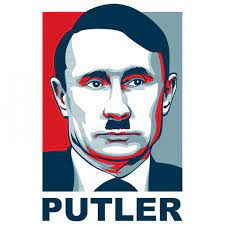Since the beginning of the “Special Operation” in Ukraine it has become increasingly common to use the word “fascist” as an insult against “the other”. Only now, and not before, the same Russians who claim to be politically opposed to the current government started calling their president a “fascist” and the more fashionable ones coined the nickname “Putler” (Putin and Hitler).
By Margarita Calderon
Articles, videos, have appeared on the internet explaining why their regime is fascist, the more audacious and enlightened have even taken the trouble to pick apart Umberto Eco’s famous essay “The Eternal Fascism”, comparing and marking the points that make them similar. This word, which during the second half of the 20th century and the Cold War was used as a definition of extreme right-wing, classist and racist governments, has become a catch-all for accusations against what is irrationally hated, and, let’s speak frankly and openly, used by people with little political, ideological and philosophical formation. Parallels and similarities are always easy to make. They lie on the surface of situations and are always tempting because of their simplicity and obviousness. Finding the differences, on the other hand, is more difficult and requires more profound analysis. Every form of government, every society is more or less repressive. Censorship exists in all countries. Europe and the USA ban Russian media, Russia has also closed access to European and American media.
This is just one example among a thousand possible parallels. Neither one nor the other is far behind. But if we are talking about differences, it would be interesting to note that in the country of the much hated and fascist “Putler” the use of foreign languages has never been forbidden, neither officially nor informally, there is no policy of racial superiority over others, but on the contrary a multicultural, multi-religious, multi-ethnic Russia is promoted. And it is not in Russia that there have been conflicts in cafes, bars, public places against people who speak other languages, migrants (especially Europeans), “pogromy” against Ukrainians, English, Germans, Poles, Lithuanians, etc. Ultra-nationalist sentiment expressed in mass demonstrations typical of fascist societies, racial pride and hatred, extreme traditionalism in terms of extreme right-wing conservatism, is rare in this Russia. It is not in Russia that foreign authors have been banned, not even Gogol because he is Ukrainian, or anyone else.
While the main generator of ethnic hatred, the Ukrainian government, destroys monuments to world heritage writers like Pushkin and Bulgakov, bans the use of the Russian language and all things Russian, Poland also hails freedom and remains obsessed with regaining its centuries-old greatness, European and American companies refuse to work with employees who have Russian names and many have been forced to change their names so that they no longer sound like the unmentionable country. I am not going to compare Zelenski or von der Leyen with Hitler, they are ultimately representatives of different times and situations. Nor am I going to continue the contest of who is more fascist than whom. But there are human values that are worth defending, such as not hating the other, not rejoicing in the pain of others, and I believe that in this Russia and the Russian people in general are far ahead of many.












